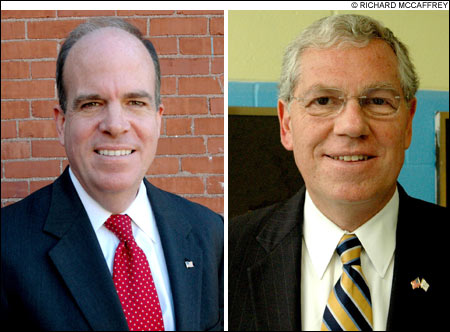Heading into the home stretch of the 2006 gubernatorial race, Lieutenant Governor Charles Fogarty has cause for hope and reason for concern.

COMBATANTS: Fogarty maintains the state can be doing better, while Carcieri says it’s on its way.
|
The Democratic gubernatorial candidate’s camp has fanned hopes of an upset, pointing to a recent USA Today/Gallup poll showing Republican incumbent Donald L. Carcieri with a mere one percent lead, well within the margin of error, over his challenger.
It’s fair to wonder, though, if a September survey by Brown University’s Darrell West, which showed Carcieri holding a 50 percent-38 percent advantage over Fogarty (up from 44 percent-39 percent in June), is closer to the mark.
Then again, the approval rating of the two men in the Brown poll — 58 percent for Carcieri, and 50 percent for Fogarty — was pretty close, and the six-point spread on whether Rhode Islanders believe the state is headed in the right direction (46 percent in favor, 39 percent opposed) hardly represents an overwhelming vote of confidence.
ADVERTISEMENT
 |
This could explain why the Carcieri camp last week became the first to launch a negative television commercial in the gubernatorial race, continuing its efforts to brand Fogarty, because of his lengthy tenure in public life, as part of the problem in state politics. Asked about the commercial, West says, “Carcieri understands that the public opinion climate is favorable to Democrats this year and he has to fight hard to make sure that he’s not swept out with other Republicans.”
Not coincidentally, the governor moved quickly in responding to a tailor-made recent incident in which a 48-year-old man — an approved medical marijuana user! — supposedly used myspace.com to meet high school-age girls for pot-smoking sessions in his Exeter trailer. On Tuesday, by unveiling a plan to combat online predators, Carcieri sent a message geared to the suburban swing voters likely to decide this election.
This fight for the middle — most Rhode Island voters are unaffiliated — explains why the lieutenant governor ramped up his campaign with an anti-corruption message over the summer. Although it seemed a bit odd, especially considering the lack of scandal associated with the incumbent, taking a page from the governor’s playbook and setting himself against the General Assembly (by embracing term limits, for example) could win Fogarty some votes.
The Democrat has sounded more traditional themes in recent weeks, steadily emphasizing such issues as jobs, access to health-care, and educational opportunity.
Fogarty has succeeded in running a competitive race, but it’s still not easy to turn out an incumbent, particularly one with a genial public persona, superb communication skills, and few prominent blunders in office. Carcieri is skillful in using political symbolism — and some key victories — such as his scrutiny of Beacon Mutual — have paid dividends.
On the plus side for the lieutenant governor, his Republican opponent has succeeded in making far more enemies among Democrats and state workers than did his quietly effective GOP predecessor, Lincoln Almond. Fogarty, who comes across well on the stump, also has potentially broader appeal to the middle than three-time gubernatorial loser Myrth York.
In 2002, Carcieri beat York handily, with a 55 percent-45 percent split — a difference of slightly more than 30,000 votes, in a race that attracted 331,834 tallies.
This time around, it remains to be seen if Fogarty’s campaign alchemy – mixing red meat for Democrats with pages from the Rhode Island GOP anti-establishment script — will be enough to win.
What’s at stake
To put it in broad brushstrokes: As an unapologetic policy nerd chasing the state’s top job, Fogarty sees government as a force for the public good; Carcieri, who spent his career in business before storming the State House in 2002, seems to view government as something more like a necessary evil.
H. Philip West Jr., executive director of Common Cause of Rhode Island, thinks both candidates have missed the mark, to some extent, in debating the ethics issue, but he respects both of them. “I think they’re both honest men, and they are genuinely dedicated to public service. They both really care about the public interest . . . That’s a personal judgment on my part, not a Common Cause position. What you see is really what you get.”
While Republicans have held the governor’s office for most of the last 20 years in Rhode Island, the 2006 gubernatorial election could still represent a particular bellwether.
Considering how state spending has grown at twice the rate of inflation over the last 10 years, Rhode Island will continue to face hard budgetary choices. According to information provided by the Rhode Island Public Expenditure Council (RIPEC), the largest driver of that increase, 49 cents on the dollar, comes from increased human service spending, followed by state aid and personnel costs.
If Caricieri wins reelection, it will be taken as a tacit endorsement of what he describes as his effort to move the state in a more fiscally responsible direction. Conversely, if Fogarty is the victor, he has signaled that he will place greater emphasis on access to health care, higher education, and other elements of the safety net traditionally associated with Democrats.